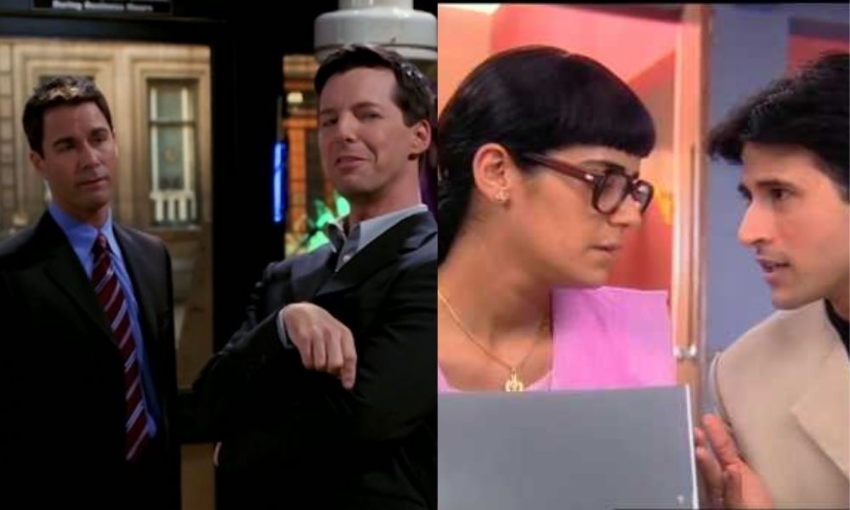
POSH & Pop Culture: Here Are The TV Shows Which Made Sexual Harassment At Work Look Funny
India, 30 Dec 2020 3:35 AM GMT
Creatives : Kumar Vibhanshu
I believe that everyone has a story to tell, all you have to do is listen. I like learning new things and believe that there can never be an end to learning, and the biggest room in this world is the Room for Improvement. Seekhte Raho........
Remember when Rachel Green hired an attractive man (Tag) to be her assistant over an experienced candidate? Well, that was so NOT cool! Ungender picks 5 such pop culture moments when inappropriate workplace conduct was made to look funny.
The effects of media on the audience has been a popular field of study since the time of the First World War. Back then, it was limited to the study of effects of propaganda, run by the government, on the citizens. With the advent of television and films, the focus of the studies broadened to include the cultural implications of media.
When it comes to gender roles and images, television and films play a crucial role in the study of popular culture. In this piece, I'll be talking about the representation of sexual harassment at workplace in the media. For this, I'll be taking five instances from popular culture, both Indian and American and elaborate on how and why they are problematic, when read in line with the POSH Act.
Yes Boss
Yes Boss! aired in India on TV in 1999. It's the story of a woman named Meera, her boss Vinod and her husband, Mohan. Meera is Mohan's boss in the office. Vinod is sexually attracted to Meera and despises Mohan. To maintain a 'pleasant' relationship with her boss, Meera hides the fact that Mohan is her husband, and lies that she is married to a much older man.
Although it is shown this as just something that comes to happen, it has a larger subtext to it. A constant reminder by Meera that she's in an unhappy marriage with a much older man, the subtext here is that of sexual dissatisfaction, which ultimately acts as a constant bone of contention for Vinod which fuels his attempts to woo Meera. The covert implication is: Vinod can offer Meera what her old husband cannot – sexual satisfaction.
The script is full of instances of hints towards inappropriate relationships between the employer and the employee, most of the times graduating to sexual innuendos: Vinod's flirtatious behaviour towards Meera; Mohan's behaviour towards the domestic worker Gangu Bai, and more.
In all of these relationships, the man openly hits on the woman, suggesting a sexual relationship between him and the employee (or vice-versa). While the women never reciprocate, they are seen to never call it out either. They are mostly shown to either not get the message or easily deflect the attempts/remarks, at which point a laughing track is played in the background. It's all in good humour apparently.
Section 2(n) of the POSH Act defines sexual harassment which includes, among others- i) sexual advances, (ii) making sexually coloured remarks, (iii) any other unwelcome physical, verbal or non-verbal conduct of sexual nature
The show is replete with instances that invoke the above-mentioned behaviour on the part of the employer.
Jassi Jaissi Koi Nahin (JJKN)
Jassi Jaisi Koi Nahin aired in 2003. The show is about an 'ugly duckling', as the show's creators described it, who is trying to find her feet in the fashion industry solely based on her interest in the company she wants to work with, Gulmohar. This show plays with the idea of beauty norms that have been attached to the job position of the secretary. As the show opens, it exudes with this new feeling that Indians were perhaps experiencing: being chic. The frames are filled with women in 'modern' clothes (you hardly see any woman in something other than a short skirt or a short dress because that's what 'fashionable' women were supposed to wear) in high-rise buildings.
One of the applicants is Pari, an upper-class, 'hot' woman who has neither worked before nor has educational qualifications, for that matter. The other is our protagonist: a less than 'average' looking woman, who is fully clothed, has braces and wears broad, thick-framed glasses. She comes from a middle-class family, is over-qualified and has previous work experience.
Can you guess who the interviewer favours? I bet you can. Jassi is asked to leave, rather rudely, while Pari is asked to stay so that the interviewer can talk to her 'some more'. The scene makes you cringe; the interviewer overtly showing interest in Pari, physically leaning in towards her, at a point, blurting out "Oh Good!" when Pari tells him she has recently been divorced.
The POSH Act defines the circumstances that amount to sexual harassment as:
(i) Implied or explicit promise of preferential treatment in her employment.
(ii) Implied or explicit threat of detrimental treatment in her employment.
While the first point falls in line with the interviewer's treatment of Pari, the second point underlines the way he behaves with Jassi.
FRIENDS
(A) Tag's Appointment
While interviewing for the position of her assistant, Rachel comes across Tag; a young, twenty-something male, who's 'gorgeous'. From the moment he walks in, the only thing she notices is his looks and how "pretty" he is. She photographs him, without his consent, while lying that it's a requirement defined by the HR. He is shown to be a weaker candidate for the job as against Hilda, an older woman with years of work experience whom Rachel hires at first. But in this case, as in Jassi's case, the looks trump the qualifications.
A mixture of the problematic portrayal of workplace harassment shown in Yes Boss and JJKN, Rachel's behaviour towards Tag matches the definitions of sexual harassment in terms of her:
(i) Making sexually coloured remarks.
(ii) Any other unwelcome physical, verbal or non-verbal conduct of sexual nature; and,
(iii) Implied or explicit promise of preferential treatment in the employee's employment.
(B) Chandler And His Boss
Throughout the show, Chandler's character has always been shown as that of the guy who leans towards the image of the 'queer', which, somehow, qualifies for the cause of him being ridiculed. In a subplot, we are shown that Chandler is uncomfortable with the way his boss 'spanks' him every chance he gets. When Phoebe asks him what he did about it, he says, "I don't want to be the guy who has a problem with his boss spanking his bottom!"
This is a clear reference to sexual harassment at workplace but since it is a guy who is being spanked, it's supposed to be taken in a 'lighter' way. It is turned into something that is more 'playful' than serious. At the end of the sub-plot, Chandler asks for 'some smacking' because he feels left out.
When the boss makes him feel 'left out' by not spanking him, this behaviour falls in line with the Section of POSH Act that defines sexual harassment as;
(i) Implied or explicit threat of detrimental treatment in the employee's employment.
(ii) Implied or explicit threat about the employee's present or future employment status.
Will And Grace
While the show was hailed as one of the fewest shows which was LGBTQ+ friendly at the time it aired, one of the characters, Jack, is involved in sub-plots that become problematic on being analysed.
Jack's character is shown to be the flamboyant gay man who meets the stereotype of gay men as being 'camp-y', playful and almost as a predator who preys on other guys; he constantly objectifies other men and misses no chance to be flirtatious towards them (Battles, Hilton-Morrow, 2002).
In a number of subplots, Jack is shown to not only objectify men, but to also take advantage of his position of being an experienced actor in the showbiz and hold auditions for fake plays just to touch the participants or make them take their clothes off.
In more than one scene, he is shown measuring a man's inseams, in order to be able to touch them inappropriately. Again, a laughing track is played at this 'playfulness' since it's a gay character and it's okay for the oppressed to oppress others in oblique ways.
Under Chapter 1, of the POSH Act(n), physical contact and advances, a demand or request for sexual favours, making sexually coloured remarks, or any other unwelcome physical, verbal or non-verbal conduct of sexual conduct, either directly or by implication, qualify for sexual harassment.
It must be noted though that the POSH Act only considers the woman employee as the aggrieved party and the gender of the perpetrator is not specified. That said, all these instances not only show what's NOT to be done in the workplace, but also reflects the conscience of the larger society that we are part of. It's high time we wake up and smell the coffee. Creating a safe and inclusive environment for ALL genders should be the highest priority for every organization.
References:
– Battles, K., Hilton-Morrow, W. 2002. Gay Characters in Conventional Spaces:Will and Graceand the SituationComedy Genre. Critical Studies in Media Communication Vol. 19, No. 1, March 2002, pp. 87–105
– Shilpa, P. , Khan, S., Ranande, S. (2011). Why Loiter?: Women and Risk on Mumbai Streets. Penguin.
– Sylvia, Marion, and Carrie. 1987. Just My Type-images of secretaries.
– Davies, K. et al. (Eds). Out of Focus:Writings on Women and the Media. The Women's Press
About the author: Mimansa Sidhnath is a freelance writer and Communications Associate at Oorvani Foundation. She likes words and wishes that the vice-versa will come true someday. She can be reached at mimansa.info@gmail.com.
Ungender Insights is the product of our learning from advisory work at Ungender. Our team specializes in advising workplaces on workplace diversity and inclusion. Write to us at contact@ungender.in to understand how we can partner with your organization to build a more inclusive workplace.
 All section
All section














